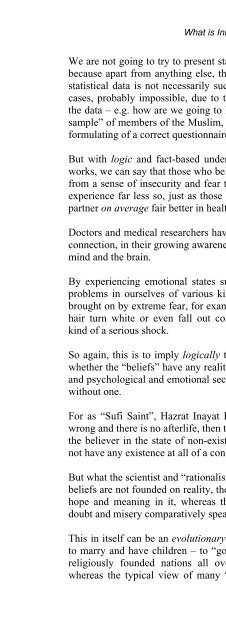07.+What+is+Intelligence+(February+2006) - Get a Free Blog
07.+What+is+Intelligence+(February+2006) - Get a Free Blog
07.+What+is+Intelligence+(February+2006) - Get a Free Blog
Create successful ePaper yourself
Turn your PDF publications into a flip-book with our unique Google optimized e-Paper software.
What is Intelligence? 21<br />
We are not going to try to present statistical data on this matter however,<br />
because apart from anything else, the gathering of reliable and accurate<br />
statistical data is not necessarily such an easy thing to do, and in many<br />
cases, probably impossible, due to the usual defects in the collection of<br />
the data – e.g. how are we going to locate and question a “representative<br />
sample” of members of the Muslim, Buddhist or Hindu worlds? – and the<br />
formulating of a correct questionnaire.<br />
But with logic and fact-based understanding of how the human psyche<br />
works, we can say that those who believe in nothing will obviously suffer<br />
from a sense of insecurity and fear that those who believe in a God will<br />
experience far less so, just as those who have the comfort of a marriage<br />
partner on average fair better in health and happiness than single people.<br />
Doctors and medical researchers have long been aware of the mind-body<br />
connection, in their growing awareness of the apparent equivalence of the<br />
mind and the brain.<br />
By experiencing emotional states such as fear, we can induce medical<br />
problems in ourselves of various kinds – even a heart attack could be<br />
brought on by extreme fear, for example, and some people have had their<br />
hair turn white or even fall out completely overnight, following some<br />
kind of a serious shock.<br />
So again, this is to imply logically that if a belief system (regardless of<br />
whether the “beliefs” have any reality or not) provides us mental comfort<br />
and psychological and emotional security, we are better off with one than<br />
without one.<br />
For as “Sufi Saint”, Hazrat Inayat Khan, pointed out: if the beliefs are<br />
wrong and there is no afterlife, then the non-believer will be as well off as<br />
the believer in the state of non-existence and oblivion – i.e. will simply<br />
not have any existence at all of a conscious kind.<br />
But what the scientist and “rationalist” overlooks, is that even if his or her<br />
beliefs are not founded on reality, the believer will spend a life which has<br />
hope and meaning in it, whereas the non-believer will spend a life of<br />
doubt and misery comparatively speaking.<br />
This in itself can be an evolutionary negative – the believer is motivated<br />
to marry and have children – to “go forth and multiply” – as we see all<br />
religiously founded nations all over the world have always done –<br />
whereas the typical view of many “rationalists” and “non-believers” is


